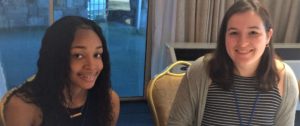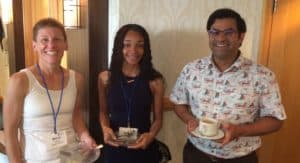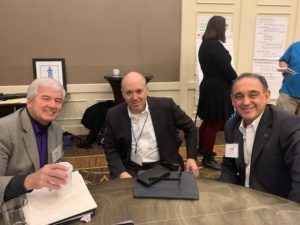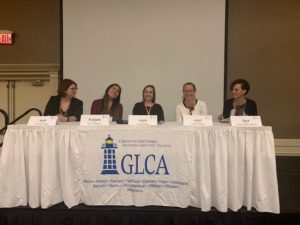January 8, 2021
The Great Lakes Colleges Association is pleased to announce the winners of the 2021 GLCA New Writers Award for Poetry, Fiction, and Creative Non-fiction. Now in its 52nd year, the New Writers Award confers recognition on promising writers who have published a first volume in one of the three genres. Judges of the New Writers Award are faculty members of creative writing and literature at GLCA’s member colleges. Winning writers receive invitations to visit GLCA member colleges – where they give readings, meet with students and faculty members, and discuss technique and creativity in the writing process.
The 2021 winner for Poetry is Marianne Chan, All Heathens, published by Sarabande Books.
Our GLCA judges note: This entire book is buoyant and richly drawn. It is funny, while not shying away from the complexities of colonizing history and its lingering presence. All Heathens feels full of love, but at the same time, a refusal to be boxed in. Chan takes risks, and in doing so, she speaks clearly, truthfully, sharply, all while singing beautifully. Her imagery – at times crystalline, at times comical, always imaginative – strike the heart and the mind.
Chan’s clarity of language in combination with her exploration of Filipino American identity moved me to consider my own place in the world. Her poems seek very much to communicate, but do so with terrific structural integrity and variety, and I felt led through the poetic process in every poem. Her reflection on her family’s status as ‘heathens’ and the term’s implied savagery, her consideration of her family’s place in US culture, and her desire to be understood all give me a sense of intimacy. I felt as if a casual confidant, made to feel part of the poet’s circle of friends.
Judges of the Poetry entries were:
Oliver Baez Bendorf, Kalamazoo College
Helena Mesa, Albion College
Pablo Peschiera, Hope College
The 2021 winner for Fiction is Gabriel Bump, Everywhere You Don’t Belong, published by Algonquin Books of Chapel Hill.
Our GLCA judges note: Gabriel Bump has written a book that stands apart as a coming-of-age story that ventures into the absurd and is by turns darkly comic. It is funny and tough-minded. The prose goes off like a rocket, powerful, a little shocking at times. The plot is big, but never overwhelms the characters, whose relationships are so poignantly drawn. The novel has astonishing narrative drive and control. Bump writes some of the most piquant, electrifying sentences and scenes. His prose seems self-assuredly his own. He draws characters who are unique and memorable. The Chicago scenes are especially compelling.
Bump positions his main character with a certain narrative distance. Claude exists between the reader and the world, and he understands this. He’s a messenger. He’s a window. He’s an Ishmael. He’s bringing the news from one world to another. While precise and particular to his time and place and telling needful stories, Claude McKay Love takes a position in American literature alongside Huck Finn, Esther Greenwood, Holden Caulfield. I sense this writer going on to write more books.
Judges of the Fiction Award were:
Emily Barton, Oberlin College
Robert Olmstead, Ohio Wesleyan University
Keija Parssinen, Kenyon College
The 2021 winner for Creative Non-fiction is Nina Boutsikaris, I’m Trying to Tell You I’m Sorry, published by Black Lawrence Press.
Our GLCA judges note: I’m Trying to Tell You I’m Sorry is both bold and spare, the troubling story of a young woman trying to find and lose herself in New York City. The prose has clear elegance like water, and the brief scenes are a testament to the power and pitfalls of being beautiful in a world all too ready to take.
I’m lost in Boutsikaris’s language, lost within these pages, lost between desire and wanting. Lost in a good way. Boutsikaris has an amazing control of lyricism, changing tone in a matter of sentences – from scholar to philosopher to character-in-the-moment. It is glorious to be witness to such precision.
Boutsikaris blurs disciplinary boundaries by employing raw and at times profane language and personal storytelling to bring theory to lived experience. And she turns the notion of the gaze on itself: as a recipient of the male gaze, she takes it and turns it outward, boldly, sighting, siting, and citing art, philosophers, and herself through reclamation of language.
Judges of the 2021 award in Creative Non-fiction were:
Marin Heinritz, Kalamazoo College
Ira Sukrungruang, Kenyon College
Lili Wright, DePauw University
For more information on the New Writers Award, please contact Gregory Wegner, Director of Program Development ([email protected]), or Colleen Monahan Smith, Executive Assistant to the President ([email protected]) at the GLCA.
Additional information is available on the GLCA web site: GLCA New Writers Award







